
Verde Canyon Railroad
|
On November 29, 2012, I rode aboard the Verde Canyon Railroad from Clarkdale to Perkinsville and back. The trip starts with views of remnants of the mining industry around Clarkdale. The ride features spectacular views of the geology of the area. Trees along the route were still displaying fall colors in late November. Several Bald Eagles were seen soaring high above the canyon. Perkinsville was one of the filming locations for the cinerama production of How the West Was Won.
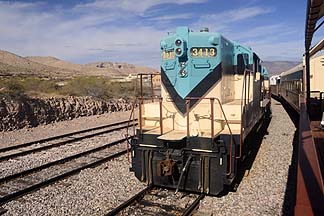 A pair of General Motors Electro Motive Division (EMD) GP9 diesel locomotives sit on a siding in the rail yard.
A pair of General Motors Electro Motive Division (EMD) GP9 diesel locomotives sit on a siding in the rail yard.
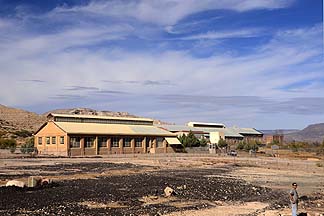 The Clark Metals Corporation Slag Recovery Project recovers gold from a large slag heap near the railroad station..
The Clark Metals Corporation Slag Recovery Project recovers gold from a large slag heap near the railroad station..
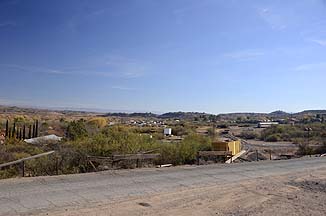 Looking back at Clarkdale as the train departs on its excursion.
Looking back at Clarkdale as the train departs on its excursion.
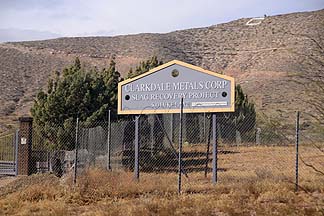 Clark Metals Corporation Slag Recovery Project
Clark Metals Corporation Slag Recovery Project
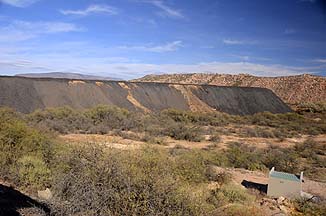 The slag heap from the old Clarkdale Mine covers forty acres. Molten slag from the mine smelter was poured onto the heap, batch by batch, for several decades.
The slag heap from the old Clarkdale Mine covers forty acres. Molten slag from the mine smelter was poured onto the heap, batch by batch, for several decades.
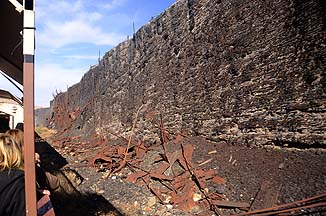 A wall of corrugated sheet metal was built to keep the slag off the railroad tracks. The rusting metal wall is disintegrating, leaving a giant cast of the corrugated metal sheets.
A wall of corrugated sheet metal was built to keep the slag off the railroad tracks. The rusting metal wall is disintegrating, leaving a giant cast of the corrugated metal sheets.
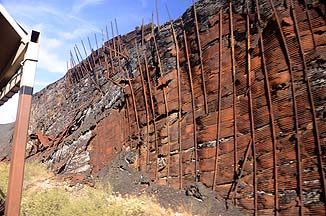 Some of the sheet metal wall is still in place.
Some of the sheet metal wall is still in place.
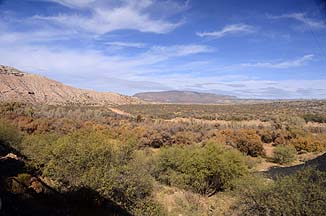 Anderson Butte dominates the horizon to the northeast. The town of Sedona is located beyond the butte to the right.
Anderson Butte dominates the horizon to the northeast. The town of Sedona is located beyond the butte to the right.
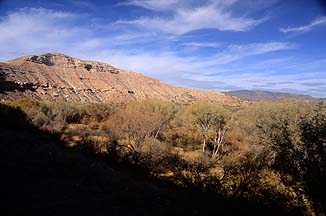 The Verde Formation on the left is composed of limestone eroded from the Kaibab Formation from above the Mogollon Rim. It was deposited in an ancient lake until a couple of million years ago.
The Verde Formation on the left is composed of limestone eroded from the Kaibab Formation from above the Mogollon Rim. It was deposited in an ancient lake until a couple of million years ago.
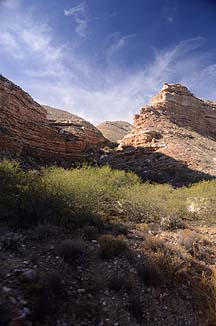 The tracks run across the mouth of a canyon near Clarkdale.
The tracks run across the mouth of a canyon near Clarkdale.
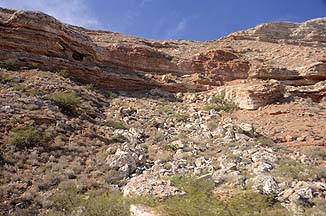 The TAPCO cliff dwellling is named for The Arizona Power Company, which operated a powerplant in the area from 1917 to 1958.
The TAPCO cliff dwellling is named for The Arizona Power Company, which operated a powerplant in the area from 1917 to 1958.
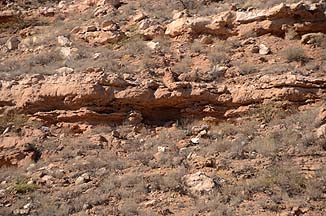 A small cave in the Verde Formation cliff.
A small cave in the Verde Formation cliff.
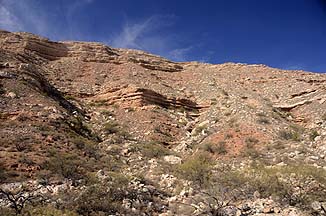 Cliffs of the Verde Formation.
Cliffs of the Verde Formation.
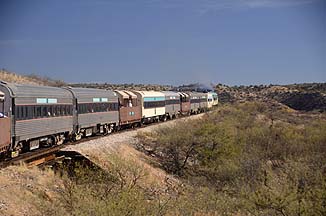 The train is composed of 1947 vintage Pullman cars with corrugated metal sides, 1938 vintage Budd stainless steel cars with flat metal sides, and open-air viewing cars.
The train is composed of 1947 vintage Pullman cars with corrugated metal sides, 1938 vintage Budd stainless steel cars with flat metal sides, and open-air viewing cars.
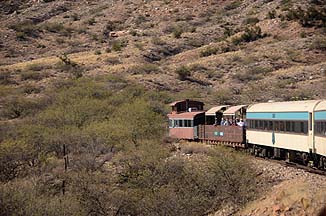 The caboose can be booked for groups of up to six.
The caboose can be booked for groups of up to six.
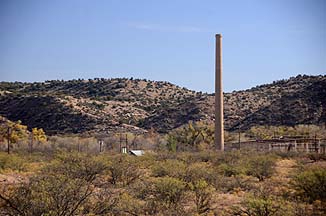 The abandoned TAPCO steam powered generating plant.
The abandoned TAPCO steam powered generating plant.
 The train is pulled by a pair of 1953 vintage EMD FP7 diesel locomotives, VCR 1510 and 1512.
The train is pulled by a pair of 1953 vintage EMD FP7 diesel locomotives, VCR 1510 and 1512.
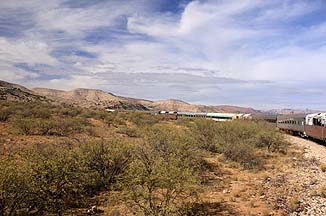 Verde Canyon Railroad excursion train.
Verde Canyon Railroad excursion train.
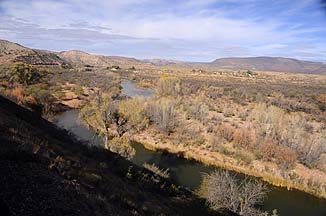 The Verde River meanders across a broad flood plain.
The Verde River meanders across a broad flood plain.
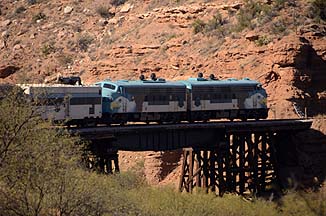 The FP7 diesels cross a trestle. They are adorned with paintings of bald eagles, which live along the route of the railroad.
The FP7 diesels cross a trestle. They are adorned with paintings of bald eagles, which live along the route of the railroad.
 Rolling through the Verde Valley.
Rolling through the Verde Valley.
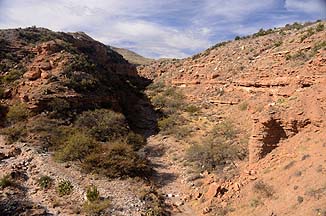 The view up canyon from the trestle.
The view up canyon from the trestle.
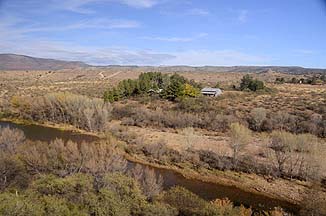 A ranch on the bank of the Verde River.
A ranch on the bank of the Verde River.
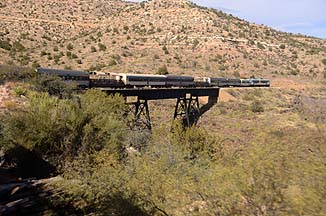 The FP7 diesels cross the S O B Canyon trestle.
The FP7 diesels cross the S O B Canyon trestle.
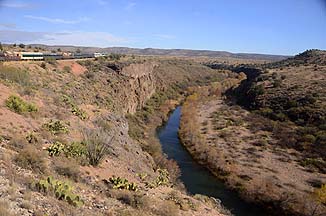 In this area, the Verde River has cut a narrow canyon into a thick volcanic basalt flow.
In this area, the Verde River has cut a narrow canyon into a thick volcanic basalt flow.
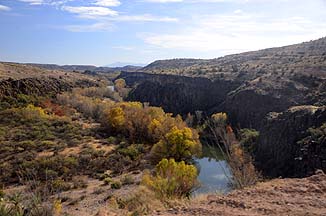 Cottonwood, Maple, and Sycamore Trees still display fall colors along the river.
Cottonwood, Maple, and Sycamore Trees still display fall colors along the river.
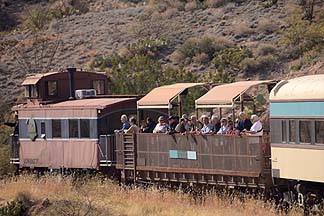 The caboose is former AT&SF Ce-2 Waycar 999373.
The caboose is former AT&SF Ce-2 Waycar 999373.
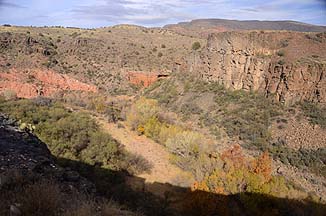 A flow of basaltic lava sits on top of 280 million year old red sandstone of the Supai Formation. A second eruption deposited a thinner layer of basalt on top of the first flow.
A flow of basaltic lava sits on top of 280 million year old red sandstone of the Supai Formation. A second eruption deposited a thinner layer of basalt on top of the first flow.
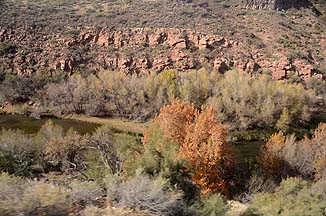 Fall color along the Verde River.
Fall color along the Verde River.
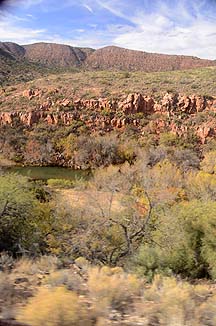 Tilted beds of Supai Sandstone can be seen in the distance. The rocks were tilted during faulting and uplift that occurred 60 to 70 million years ago.
Tilted beds of Supai Sandstone can be seen in the distance. The rocks were tilted during faulting and uplift that occurred 60 to 70 million years ago.
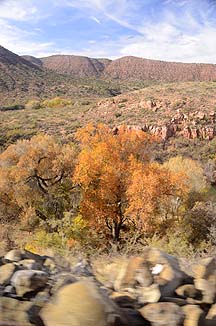 A large Cottonwood Tree sports yellow leaves.
A large Cottonwood Tree sports yellow leaves.
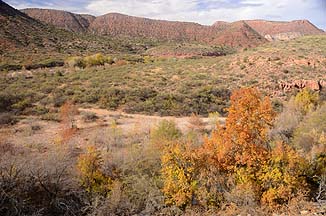 The rocks in the surrounding mountains are from the Cambrian, Devonian, Mississippian, Pensylvaian, and Permian Periiods. Any rocks deposited in the Silurian and Ordivician Periods were eroded away, leaving an uncomformity in the stratiggraphic column.
The rocks in the surrounding mountains are from the Cambrian, Devonian, Mississippian, Pensylvaian, and Permian Periiods. Any rocks deposited in the Silurian and Ordivician Periods were eroded away, leaving an uncomformity in the stratiggraphic column.
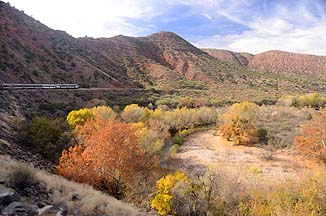 The train rounds a bend overlooking the fall colors along the Verde River.
The train rounds a bend overlooking the fall colors along the Verde River.
 EMD FP7 VCR1512 and VCR 1510 cross another trestle.
EMD FP7 VCR1512 and VCR 1510 cross another trestle.
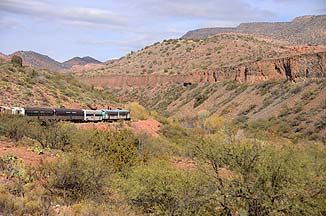 The Redwall Limestone on the left bank of the Verde River is about 300 million years older than the Basalt lave flows on the right bank.
The Redwall Limestone on the left bank of the Verde River is about 300 million years older than the Basalt lave flows on the right bank.
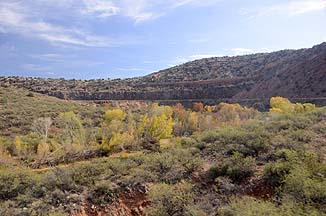 Verde Formation Limestone was deposited on top of tvolcanic Basalt and tilted beds of Redwall Liimestone.
Verde Formation Limestone was deposited on top of tvolcanic Basalt and tilted beds of Redwall Liimestone.
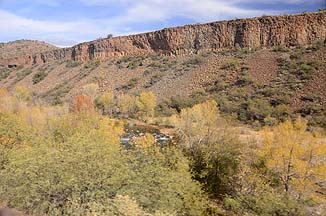 The Verde River flows through rapids below a Basalt lava cliff that displays columnar jointing. The lava cracked into columns as it cooled and contracted.
The Verde River flows through rapids below a Basalt lava cliff that displays columnar jointing. The lava cracked into columns as it cooled and contracted.
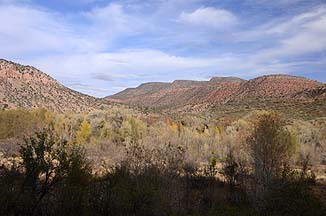 The mouth of Sycamore Canyon at the north end of the Verde Valley.
The mouth of Sycamore Canyon at the north end of the Verde Valley.
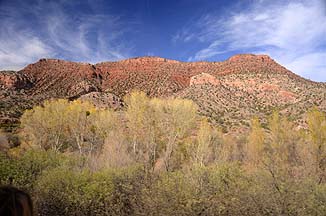 The lowest rocks in this picture are 500 million year old Tapeats Sandstone from the Cambrian Period. Limestone and dolomite of the Martin Formation from the Devonian Period rest unconformably on top of the Tapeats Sandstone. The Martin Formation is about 150 million years younger than the Tapeats Sandstone. The red rocks above the Martin Formation are Redwall Limestone from the Mississippian Period. The cliffs are capped with Supai Sandstone from the Pennsylvanian Period, about 300 million years old. Any rocks deposited more recently were eroded before volcanoes erupted Basalt lava and the Verde Formation was deposited in the ancient lake that filled the Verde Valley.
The lowest rocks in this picture are 500 million year old Tapeats Sandstone from the Cambrian Period. Limestone and dolomite of the Martin Formation from the Devonian Period rest unconformably on top of the Tapeats Sandstone. The Martin Formation is about 150 million years younger than the Tapeats Sandstone. The red rocks above the Martin Formation are Redwall Limestone from the Mississippian Period. The cliffs are capped with Supai Sandstone from the Pennsylvanian Period, about 300 million years old. Any rocks deposited more recently were eroded before volcanoes erupted Basalt lava and the Verde Formation was deposited in the ancient lake that filled the Verde Valley.
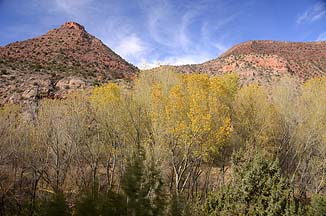 Sycamore Trees line the Verde River. A fault runs through the middle of this picture. The Tapeats Sandstone is exposed on the right, but it is deep underground on the left. The rocks on the left are over 150 milllion years younger than the rocks on the right.
Sycamore Trees line the Verde River. A fault runs through the middle of this picture. The Tapeats Sandstone is exposed on the right, but it is deep underground on the left. The rocks on the left are over 150 milllion years younger than the rocks on the right.
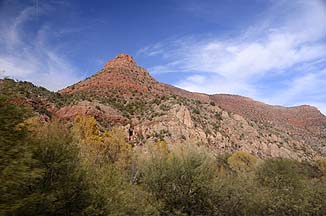 Rocks of the Martin Formation are exposed next to the river.
Rocks of the Martin Formation are exposed next to the river.
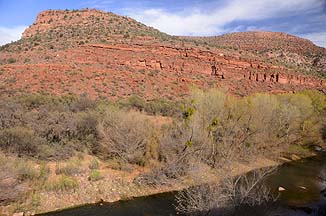 The gray rocks in the background are much older than the the red limestone cliffs in the foreground.
The gray rocks in the background are much older than the the red limestone cliffs in the foreground.
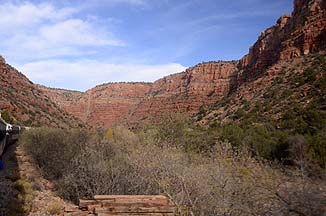 The Verde River has carved a deep canyon through Redwall Limestone.
The Verde River has carved a deep canyon through Redwall Limestone.
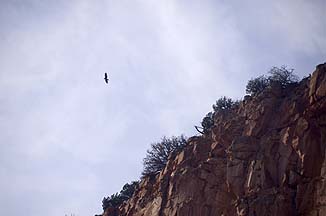 A Bald Eagle soars high overhead. Several eagles were seen along the excursion.
A Bald Eagle soars high overhead. Several eagles were seen along the excursion.
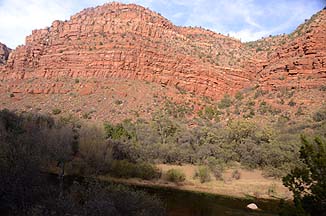 The Verde River flows below cliffs of Redwall Limestone.
The Verde River flows below cliffs of Redwall Limestone.
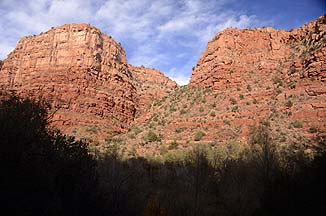 A tributary canyon in Mormon Pocket.
A tributary canyon in Mormon Pocket.
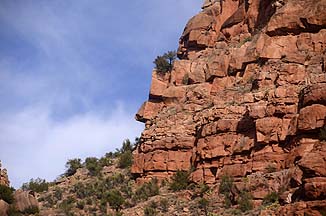 Rocks in the cliff resemble a stone face.
Rocks in the cliff resemble a stone face.
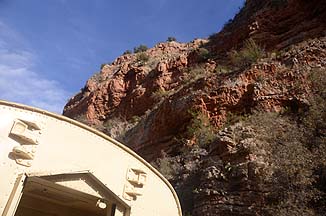 The tracks run close to the base of Redwall Limestone cliffs.
The tracks run close to the base of Redwall Limestone cliffs.
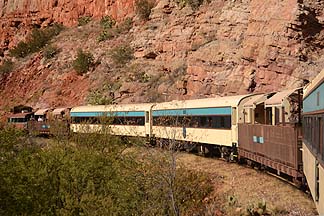 Rolling through the Verde Canyon.
Rolling through the Verde Canyon.
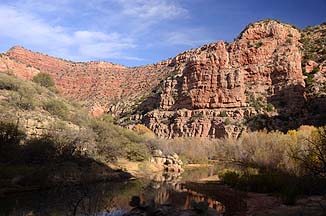 Rocks of the Martin Formation are exposed along the Verde River.
Rocks of the Martin Formation are exposed along the Verde River.
 A Bald Eagle soars high overhead.
A Bald Eagle soars high overhead.
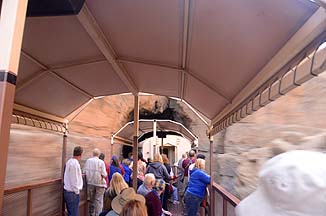 Entering a tunnel at a tight bend in the Verde River.
Entering a tunnel at a tight bend in the Verde River.
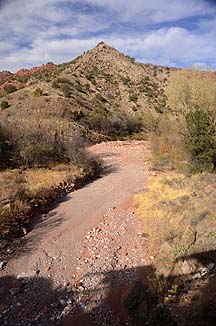 Crossing a bridge over a dry wash.
Crossing a bridge over a dry wash.
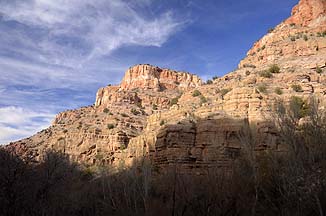 The upper reach of the Verde Canyon.
The upper reach of the Verde Canyon.
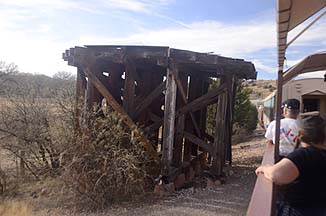 The base of the water tank at Perkinsville. The tank itself was destroyed during the filming of the movie How the West Was Won fifty years ago.
The base of the water tank at Perkinsville. The tank itself was destroyed during the filming of the movie How the West Was Won fifty years ago.
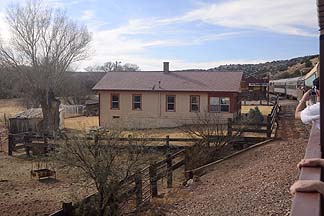 The residence of the Perkins family.
The residence of the Perkins family.
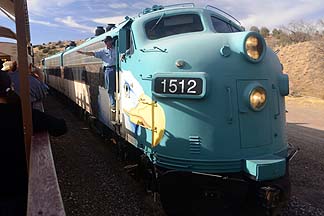 EMD FP7 VCR1512 and VCR 1510 move to the other end of the train for the return trip to Clarkdale.
EMD FP7 VCR1512 and VCR 1510 move to the other end of the train for the return trip to Clarkdale.
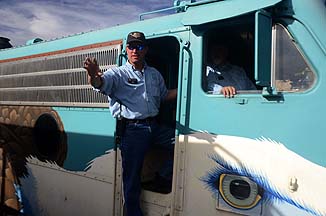 The engineer of EMD FP7 VCR1512.
The engineer of EMD FP7 VCR1512.
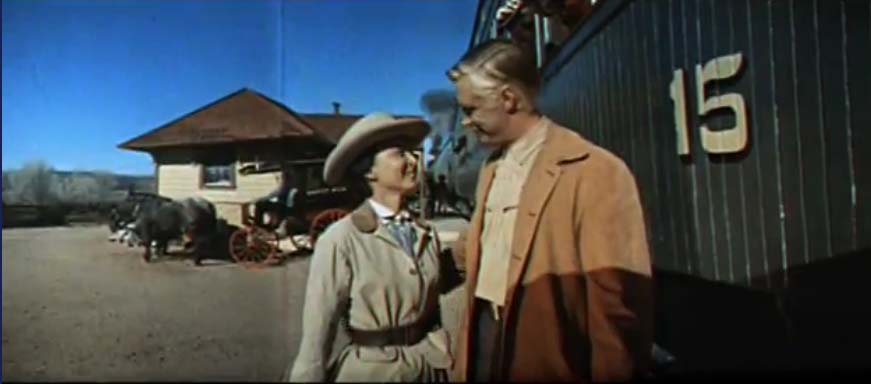 The Perkinsville Depot appeared in the movie How the West Was Won with George Peppard and Carolyn Jones in Cinerama.
The Perkinsville Depot appeared in the movie How the West Was Won with George Peppard and Carolyn Jones in Cinerama.
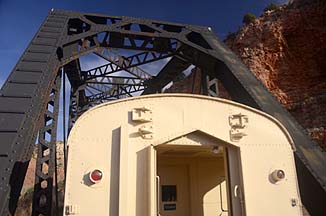 Crossing the bridge at Orchard Draw.
Crossing the bridge at Orchard Draw.
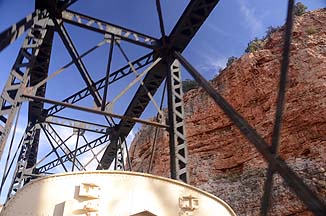 Crossing the bridge at Orchard Draw.
Crossing the bridge at Orchard Draw.
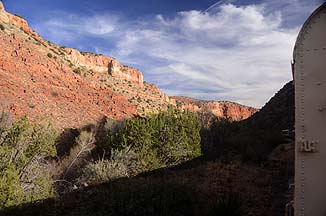 The upper reach of the Verde Canyon.
The upper reach of the Verde Canyon.
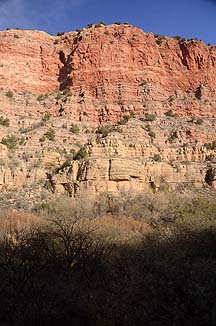 Redwall Limestone resting on the Martin Formation.
Redwall Limestone resting on the Martin Formation.
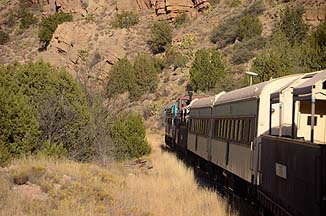 Rolling through the Verde Canyon.
Rolling through the Verde Canyon.
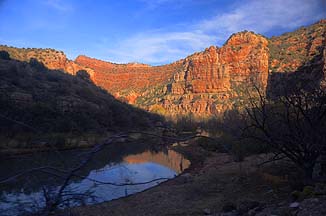 The canyon wall reflected in the Verde River.
The canyon wall reflected in the Verde River.
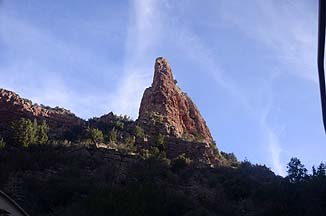 A spire rises above the canyon.
A spire rises above the canyon.
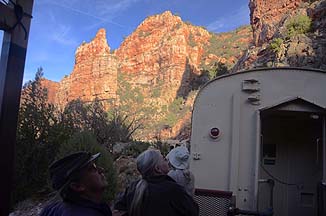 Cliffs of Redwall Limestone tower above the train.
Cliffs of Redwall Limestone tower above the train.
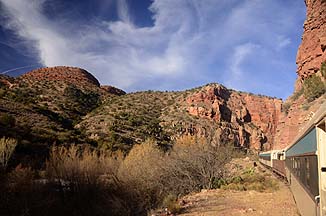 Rolling through the Verde Canyon.
Rolling through the Verde Canyon.
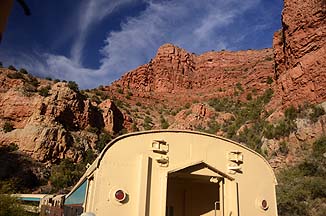 Cliffs of Redwall Limestone tower above the train.
Cliffs of Redwall Limestone tower above the train.
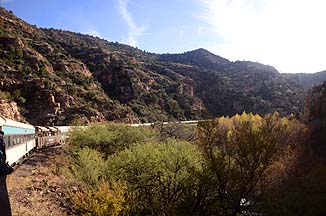 Rolling through the Verde Canyon.
Rolling through the Verde Canyon.
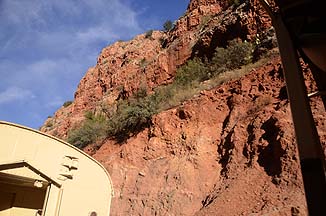 Cliffs of Redwall Limestone tower above the train.
Cliffs of Redwall Limestone tower above the train.
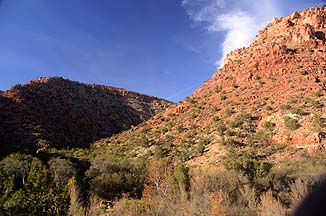 Tributary Canyon at Mormon Pocket.
Tributary Canyon at Mormon Pocket.
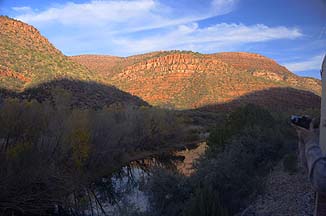 The canyon wall reflected in the Verde River.
The canyon wall reflected in the Verde River.
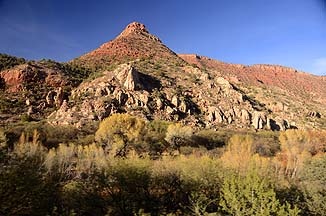 Outcrop of the Martin Formation exposed below cliffs of Redwall Limestone.
Outcrop of the Martin Formation exposed below cliffs of Redwall Limestone.
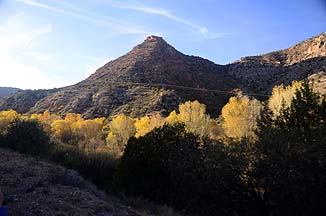 Fall colors of the Sycamore Trees along the Verde River.
Fall colors of the Sycamore Trees along the Verde River.
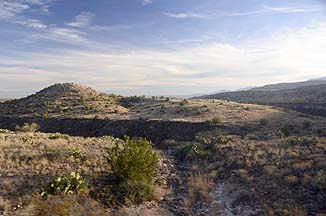 Verde Limestone resting on volcanic Basalt exposed along the Verde River.
Verde Limestone resting on volcanic Basalt exposed along the Verde River.
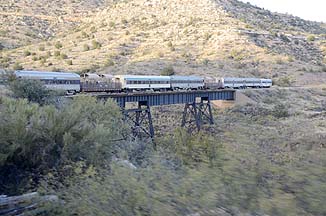 Crossing the S O B Canyon Trestle.
Crossing the S O B Canyon Trestle.
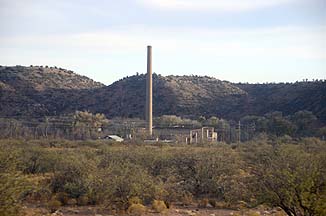 The abandoned TAPCO steam powered generating plant.
The abandoned TAPCO steam powered generating plant.
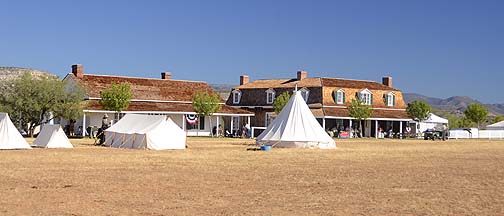 The Verde Valley is home to Camp Verde and the Verde Canyon Railroad.
The Verde Valley is home to Camp Verde and the Verde Canyon Railroad.
 Send a message to Brian.
Send a message to Brian.